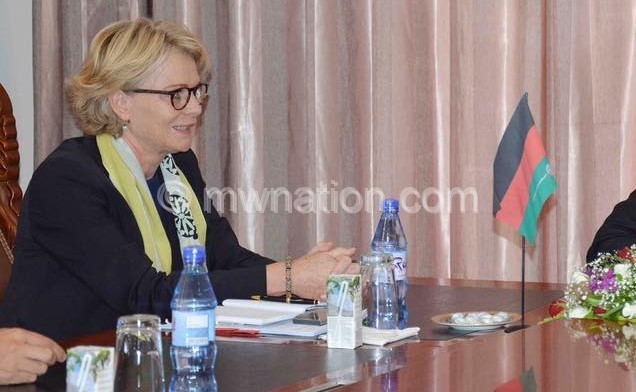EU pushes for electoral reforms
The European Union (EU) has stressed the need for Malawi to spearhead electoral reforms by tabling the Electoral Reforms Bill in Parliament to maintain stakeholder confidence in the electoral system.
Briefing journalists in Lilongwe at the end of its mission in Malawi yesterday, the EU Election Follow-up Mission (EU-EFM), which followed up on recommendations made after the May 20 2014 Tripartite Elections, said reforms are critical especially at this time when the country is preparing for the 2019 general elections.

EU-EFM leader of delegation Birgittee Markussen, who said the reforms are key to free, fair and transparent elections, noted that based on the recommendations the EU Observer Mission made in 2014, Malawi seems to be taking important steps.
She said if the trend continues, especially in the legal perspective, something good might come up.
Said Markussen: “The main challenges in the conduct of polls in 2014 were related to voter registration, preparations, results management, and malpractices during campaign and handling of results.
“We note that the Malawi Electoral Commission [MEC] has started addressing some of the issues administratively and it looks promising.”
However, she said the country also needs to work on making political parties disclose sources of their funding and details of their campaign expenditure to avoid plunder of public resources as outlined in the draft Political Parties Bill.
In the last meeting of Parliament, the Minister of Justice and Constitutional Affairs Samuel Tembenu tabled the Political Parties Bill as Bill number 40 of 2016. The Bill was later referred to Parliament’s Legal Affairs Committee for further scrutiny on several issues, including the definition of handouts which the EU team also noted.
Article 41 (1) of the Bill states that a candidate or political party contesting in an election shall not issue handouts and failure to adhere to the provision is an offence attracting a K10 million fine or five years imprisonment.
The Bill defines a handout as a transaction whereby political parties or candidates distribute goods, cash, gifts and other items to a person as an enticement to vote for the political party or the candidate.
Besides the Bill, the EU mission also stressed the need for accessible and effective systems to handle electoral disputes as well as the need for enforcement of law on fair and balanced electoral coverage by State media, among others.
The mission has since commended the ongoing National Identification Cards Registration, saying it will help in the voter registration and avoid costs.
Responding to the statement, MEC chairperson Jane Ansah said the observations and findings were a true reflection of the situation on the ground.
She said as a commission they are working to fulfil the administrative part as they can only implement the legal aspect after Parliament passes the Electoral Reforms Bill.
Ansah, who is a judge of the Malawi Supreme Court of Appeal, said: “We are making steps to making our democracy develop, the statement from the mission is a true reflection of what is on the ground. We are just waiting for Parliament to fulfil the legal aspect, but administratively we are doing our best.”
She said she was optimistic that the Bill will be tabled in the National Assembly in November as promised by Tembenu.
During its tour, the EU team met several stakeholders, including political parties, President Peter Mutharika, Minister of Justice and Constitutional Affairs, civil society leaders, Speaker of Parliament Richard Msowoya and MEC officials.
Reacting to the mission’s observations, Malawi Electoral Support Network (Mesn) executive director Steve Duwa said it is tricky for the country to fully implement some of the changes in the Electoral Reforms Bill, including the 50+1 electoral system for deciding the presidential vote.
He said if the Bills are passed into law, the reforms are doable, but stressed that the key lay in implementation by those involved and enhanced civic education to both the political parties and the citizens.
Said Duwa: “We cannot say they [all reforms] can be used in 2019 just after being passed because there is need for a lot of civic education. But all in all, the amendments are doable and they are based on people’s views, so it will not be hard for people to adopt them.”
The Special Law Commission on the Review of Electoral Law recommended the enactment of six pieces of legislation, among them one which would provide for the transition between one President to another.
The Bills, collectively called Electoral Reforms Bill, are Constitution (Amendment), Electoral Commission (Amendment), Presidential, Parliamentary and Local Government Elections, Assumption of the Office of President (Transitional Arrangement) and Referendum.
However, the EU delegation said they are not in a position to decide which electoral system a country should follow as that choice of a particular country.
The team has also welcomed proposals by the Law Commission to increase the independence of MEC, saying it will be important for MEC and central government to develop a budget covering all potential scenarios to ensure high state of preparedness.





